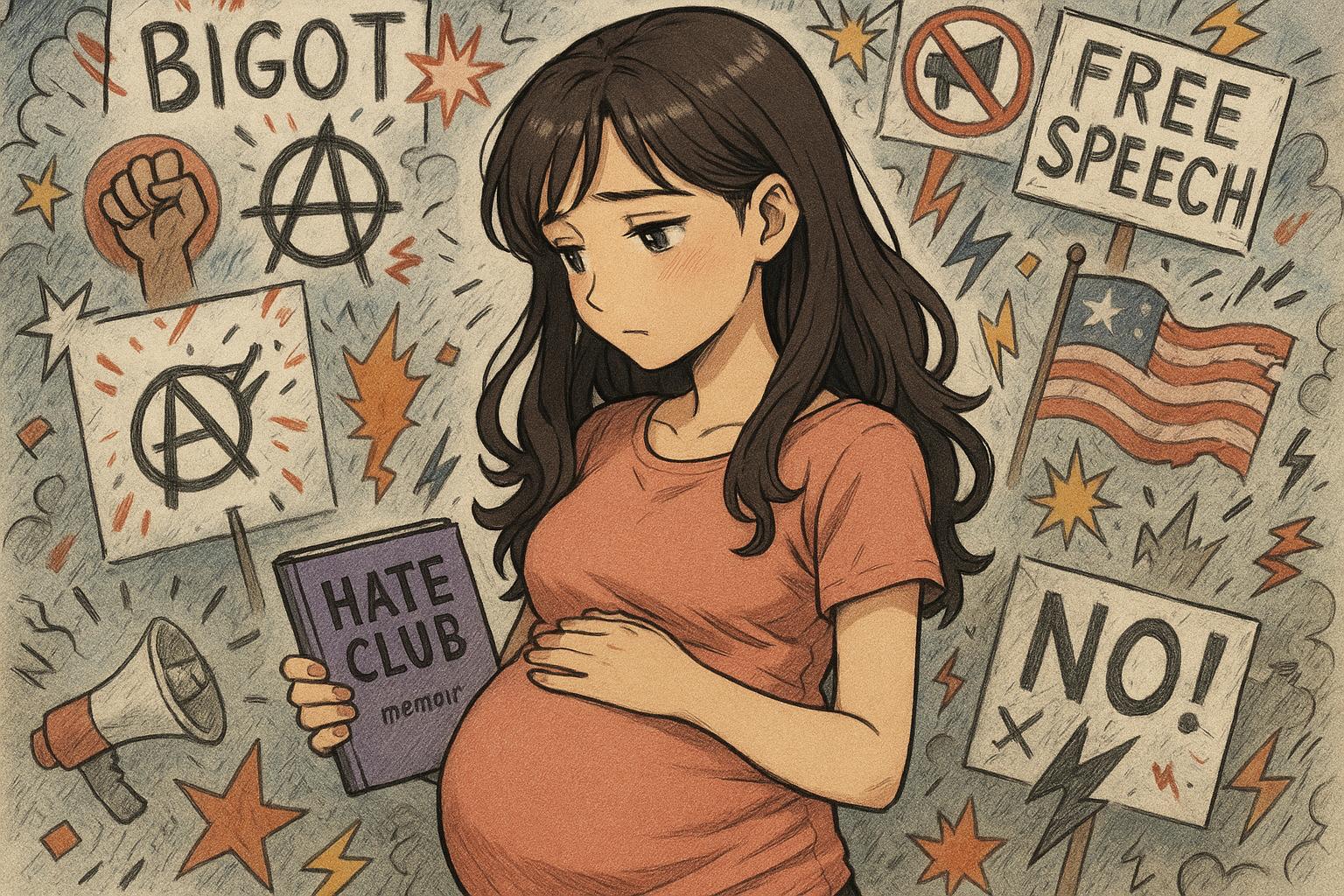Lucy Brown, partner of art dealer Sascha Bailey, reveals her disillusionment with free speech absolutism and the toxic dynamics of far-right activism in her forthcoming memoir Hate Club, shedding light on internal conflicts and misogyny within these movements.
Lucy Brown, the girlfriend of art dealer Sascha Bailey—son of the iconic photographer David Bailey—is set to release a memoir that promises to delve deep into her tumultuous experiences within the world of free speech activism. The book, currently titled Hate Club, aims to expose the chaotic dynamics and personalities that populate this controversial sphere, including infamous figures such as Tommy Robinson and Milo Yiannopoulos.
Brown’s engagement with far-right activism has previously drawn scrutiny; she has candidly reflected on the transformation of Robinson, a central figure in the English Defence League, claiming his character shifted dramatically as his fame and financial success grew. “He became very nasty and misogynistic,” Brown stated, portraying the darker side of a movement which often cloaks itself in ideals of freedom and justice.
In her forthcoming memoir, Brown intends to share insights from her involvement in the ill-fated Day for Freedom event in London in 2018, a gathering intended to celebrate free speech that quickly descended into discord. “We tried to make it all free speech and punk and edgy and then it all blew up,” she recalls, suggesting a profound disillusionment with the very principles she once championed. Her decision to self-publish further indicates her desire for authenticity, believing that mainstream publishers might dilute her narrative.
Brown’s attitude toward the notion of absolute free speech has undergone a significant evolution. Now pregnant with her first child, she reflects on her past ideals with a more critical lens. “I hate free speech [absolutism] … it’s just a stupid concept that flits and changes depending on whether you like the person,” she asserts, illustrating a broader debate surrounding the limits and responsibilities of free expression, particularly in a volatile political landscape.
Sascha Bailey, who has his own story of personal transformation—embracing his identity as a man after a long journey of self-discovery—occupies a supportive role amidst this tumult. Their relationship signifies not only personal growth for both but also underscores the complexities of navigating love in the backdrop of political upheaval. The pressures of being entwined with far-right ideologies are contrasted against Bailey’s own artistic aspirations; he runs his art curation company, Quite Useless, where he aims to support emerging talents, reflecting a desire to distance himself from the shadows of his father’s legacy.
In a milieu rife with misogyny and narcissism, as Brown describes, the memoir could serve as both a personal catharsis and a stark illumination of the alt-right’s internal conflicts. Her reflections echo broader concerns around the toxic environments that can thrive within these circles, particularly for women. The discontent she feels towards certain free speech advocates reveals a tectonic shift not only in her perspectives but perhaps in those of a generation grappling with the ramifications of unchecked rhetoric.
As Brown prepares to unleash her narrative upon the world, the implications of her revelations may resonate far beyond her individual experiences, prompting readers to reflect on the ethical dilemmas surrounding freedom of speech and its impact on society as a whole.
Reference Map
- Paragraphs 1, 2, 3, 4, 5, 6
- Paragraph 1, 2, 3, 4
- Paragraph 5
- Paragraph 5
- Paragraph 6
Source: Noah Wire Services
- https://www.dailymail.co.uk/tvshowbiz/article-14729439/Richard-Eden-David-Bailey-son-girlfriend-memoir.html?ns_mchannel=rss&ns_campaign=1490&ito=1490 – Please view link – unable to able to access data
- https://medium.com/@lucymarionbrown/illuminating-the-alt-rights-darkness-shedding-light-on-the-underbelly-of-online-misogyny-2f55b0b3da0d – Lucy Marion Brown discusses her experiences within the alt-right movement, highlighting the prevalence of online misogyny and the challenges faced by women in these circles. She reflects on her time working alongside figures like Tommy Robinson and Milo Yiannopoulos, emphasizing the toxic dynamics and the personal toll of engaging with such ideologies. Brown also touches upon the complexities of free speech activism and the internal conflicts that arise when confronting these issues.
- https://www.independent.co.uk/arts-entertainment/art/news/sascha-bailey-david-son-change-genders-b2544256.html – Sascha Bailey, son of renowned photographer David Bailey, shares his journey of self-discovery and the challenges he faced regarding his gender identity. After moving back to London from Japan, Bailey met Lucy Brown, who had previously worked with Tommy Robinson. Their relationship played a pivotal role in his decision to embrace his identity as a man, highlighting the complexities and personal struggles associated with gender transition.
- https://www.theupcoming.co.uk/2016/04/08/interview-sascha-bailey-talks-art-and-family-with-the-upcoming-at-lights-of-soho/ – In an interview with The Upcoming, Sascha Bailey discusses his art curation company, Quite Useless, and its mission to support emerging artists. He reflects on his upbringing in the art world, influenced by his father, David Bailey, and shares insights into the challenges and rewards of working with family in the art industry. The conversation also delves into the dynamics of curating exhibitions and the importance of fostering new talent.
- https://www.refinery29.com/en-us/2013/04/46296/david-bailey-sons-photography-show – Refinery29 reports on the first photography exhibition by David Bailey’s sons, Fenton and Sascha Bailey, titled ‘Human Remains.’ The exhibition explores human relationships and interactions, showcasing the brothers’ work in the art world. The article highlights the brothers’ independent achievements and their efforts to establish themselves in the art scene, separate from their father’s legacy.
- https://www.independent.co.uk/tv/news/uk-riots-tommy-robinson-lucy-brown-b2591988.html – Lucy Brown, former assistant to Tommy Robinson, discusses the impact of Robinson’s actions on recent riots in the UK. She claims that Robinson’s ego and inflammatory rhetoric have contributed to escalating tensions and violence. Brown reflects on her experiences working with Robinson and the challenges of confronting such ideologies, emphasizing the need for responsible leadership and the consequences of unchecked rhetoric.
- https://www.surgeradio.cl/opiniones/i-was-in-tommy-robinsons-inner-circle-he-hates-his-own-supporters-woman-who-worked-for-edl-founder-claims-he-wanted-to-get-as-far-away-as-possible-from-army-of-fans-a/61955/ – An article detailing Lucy Brown’s experiences working closely with Tommy Robinson, founder of the English Defence League. Brown describes Robinson’s disdain for his own supporters and his desire to distance himself from them. She recounts instances where Robinson’s behavior and attitudes led to internal conflicts and public controversies, shedding light on the complexities of working within such a charged political environment.
Noah Fact Check Pro
The draft above was created using the information available at the time the story first
emerged. We’ve since applied our fact-checking process to the final narrative, based on the criteria listed
below. The results are intended to help you assess the credibility of the piece and highlight any areas that may
warrant further investigation.
Freshness check
Score:
8
Notes:
The content discusses a forthcoming memoir and recent life events, suggesting it is relatively fresh. However, the references to past events and figures like Tommy Robinson and the 2018 Day for Freedom event indicate some historical context.
Quotes check
Score:
6
Notes:
The quotes from Lucy Brown are not verified against earlier sources. Without further online evidence, these could be original or previously reported.
Source reliability
Score:
7
Notes:
The narrative originates from Daily Mail, a well-known publication. While it is generally reliable, its sensationalist nature can sometimes lead to biased reporting.
Plausability check
Score:
9
Notes:
The claims about Lucy Brown’s memoir and her reflections on free speech activism are plausible, given her past involvement in controversial movements. The narrative aligns with broader societal debates on free speech.
Overall assessment
Verdict (FAIL, OPEN, PASS): OPEN
Confidence (LOW, MEDIUM, HIGH): MEDIUM
Summary:
The narrative appears to be relatively fresh and plausible, focusing on Lucy Brown’s memoir and her experiences with free speech activism. The source is generally reliable, but the sensational nature of Daily Mail can sometimes lead to biased reporting. The quotes lack verification against earlier sources.













